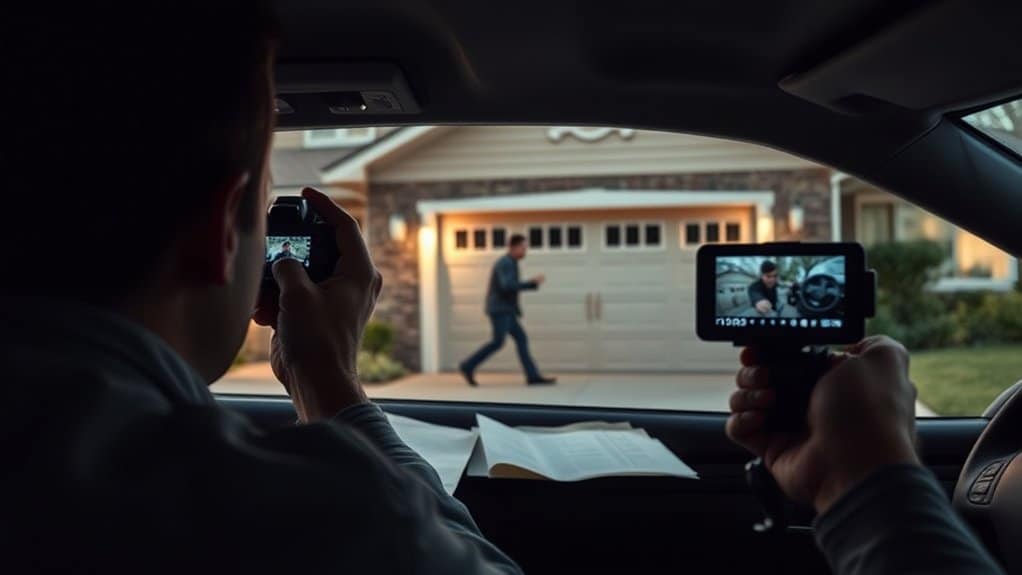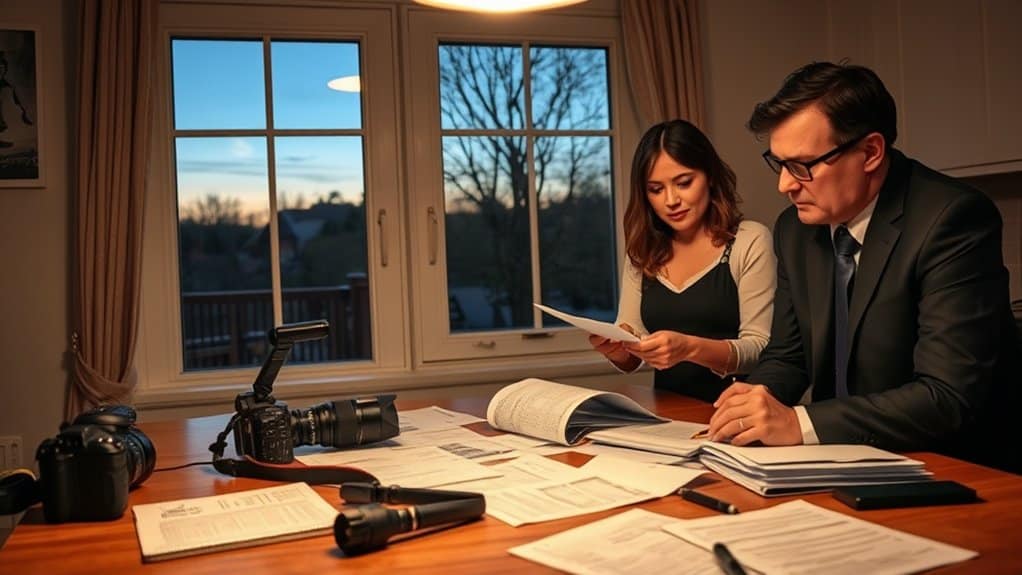Private investigators document domestic abuse through systematic collection of evidence including photographs, audio recordings, video footage, financial records, and witness statements. They follow strict legal guidelines for surveillance and chain of custody while maintaining victim safety protocols. Digital evidence gathering requires secure storage and encryption methods. PIs coordinate closely with advocates and legal teams to build court-admissible documentation. Understanding proper investigative techniques guarantees successful case outcomes.
Key Takeaways
- Private investigators document physical abuse through photographs, maintaining proper consent and chain of custody for court admissibility.
- Surveillance techniques gather evidence of threatening behavior while following state regulations and prioritizing victim safety protocols.
- Digital evidence collection includes tracking social media, preserving metadata, and securing communications through encryption and authentication methods.
- Investigators coordinate with legal teams and advocates to ensure evidence meets court requirements and supports victim protection.
- Detailed chronological records, including incident logs and witness statements, establish patterns of abuse for stronger legal cases.
Types of Domestic Abuse Evidence Documented by PIs

Private investigators document multiple categories of domestic abuse evidence through specialized investigative techniques and surveillance methods. The evidence types they gather include photographic documentation of physical injuries, audio recordings of verbal threats and confrontations, and video footage showing patterns of controlling or aggressive behavior.
PIs systematically collect and preserve evidence of financial abuse through bank records, property documents, and documentation of economic control tactics. They document abuse patterns by gathering witness statements, maintaining detailed incident logs, and compiling electronic evidence like threatening text messages, emails, and social media posts. Additional evidence categories include stalking behavior documentation, child abuse indicators, and evidence of isolation tactics used against victims. All evidence is collected according to proper chain of custody protocols to guarantee admissibility in legal proceedings. Licensed private investigators provide objective expert testimony that can significantly impact legal outcomes in domestic abuse cases.
Legal Guidelines for Collecting Domestic Violence Evidence
When gathering domestic violence evidence, investigators must strictly adhere to state and federal legal requirements to guarantee admissibility in court proceedings. Private investigators need documented consent from clients before conducting surveillance or collecting evidence. They must operate within domestic violence laws while avoiding trespassing, harassment, or invasion of privacy.
Evidence admissibility depends on proper documentation of chain of custody and compliance with legal collection methods. Investigators should maintain detailed records of dates, times, locations, and methods used to gather evidence. Photography and video recording must occur in public spaces or with proper authorization. Audio recordings typically require consent from at least one party, though requirements vary by state. All evidence must be preserved securely to maintain integrity and prevent tampering allegations.
Licensed investigators must follow ethical guidelines established by regulatory bodies like the National Association of Legal Investigators to maintain professional credibility.
Surveillance Techniques and Documentation Methods
Professional investigators must follow strict protocols when documenting domestic abuse through covert photography, including maintaining distance requirements and using specialized lenses that preserve image quality while remaining undetected. GPS tracking devices require proper authorization and adherence to state-specific regulations regarding their placement and monitoring duration. These surveillance methods necessitate meticulous record-keeping of dates, times, and locations to guarantee evidence admissibility in legal proceedings. Investigators with over 50 years of combined investigative experience ensure comprehensive documentation while maintaining strict client confidentiality and professional standards.
Covert Photo Documentation Methods
Documenting domestic abuse through covert photography requires specialized techniques that balance evidence collection with safety and legal compliance. Private investigators employ discreet documentation strategies that minimize detection while maximizing evidential value. These methods often include the use of concealed cameras, long-range lenses, and specialized low-light equipment.
Covert photography techniques must adhere to strict legal guidelines regarding privacy rights and admissible evidence. Investigators typically photograph incidents from public spaces, documenting patterns of behavior, physical injuries, and property damage. They maintain detailed logs correlating images with dates, times, and locations to establish credible documentation. When gathering photographic evidence, investigators must also consider the safety implications for abuse survivors, ensuring their documentation methods do not compromise the victim’s security or escalate dangerous situations.
GPS Tracking Safety Protocols
Safe GPS tracking during domestic abuse investigations requires strict adherence to established protocols and legal parameters. Investigators must balance location privacy concerns with victim safety while maintaining gps tracking ethics throughout surveillance operations.
| Protocol Element | Implementation Requirement |
|---|---|
| Device Security | Tamper-proof housing, encrypted signals |
| Data Protection | Secure storage, limited access protocols |
| Legal Compliance | Court orders, documented authorization |
| Installation Safety | Concealed placement, battery life monitoring |
| Emergency Response | Rapid alert system, law enforcement coordination |
Investigators should verify tracking device placement authorization through proper channels and maintain detailed documentation of all monitoring activities. Real-time location data must be transmitted through secured networks and accessed only by authorized personnel. Regular system checks guarantee device functionality while minimizing detection risk. All gathered evidence requires proper chain of custody procedures to maintain admissibility in legal proceedings.
Digital Evidence Gathering and Preservation Protocols
Digital evidence plays an essential role in domestic abuse investigations, requiring strict protocols to maintain its admissibility in legal proceedings. Private investigators must document each step of the digital footprint analysis process, including timestamps, file locations, and chain of custody records.
Social media monitoring requires systematic archival methods, including screen captures, metadata preservation, and secure storage of downloaded content. Investigators utilize specialized software to authenticate digital communications, photographs, and video evidence while maintaining original file integrity.
All digital evidence gathering must comply with applicable privacy laws and ethical guidelines. Investigators implement encryption protocols for evidence storage and transfer, maintaining detailed logs of access and modifications. Regular backups guarantee preservation of critical digital evidence, while following industry-standard forensic procedures enhances credibility in court proceedings. Specialized tools like write blockers are essential for maintaining evidence integrity when examining digital devices.
Collaborating With Advocates and Legal Teams

Private investigators maintain strict documentation chains of custody when collaborating with domestic violence advocates and legal teams to guarantee evidence admissibility in court proceedings. Coordination between investigators and support services enables thorough victim assistance while gathering critical case evidence. The development of legal strategy requires systematic communication between investigators, attorneys, and advocacy professionals to build compelling cases that protect survivors’ interests. Similar to combating Medicare fraud detection, thorough documentation and data analysis are essential tools for building strong legal cases that protect vulnerable individuals.
Documentation Chain of Custody
Establishing and maintaining a clear chain of custody for domestic abuse evidence requires systematic collaboration between private investigators, victim advocates, and legal counsel. Evidence preservation begins with meticulous documentation of when, where, and how each piece of evidence was collected, including detailed descriptions, photographs, and secure storage methods.
Following investigative ethics protocols, private investigators must maintain thorough logs tracking every individual who handles the evidence. This includes timestamps, signatures, and the purpose for each transfer. All documentation should be duplicated, with copies stored separately for security. When evidence changes hands between investigators, advocates, and attorneys, standardized transfer forms must be completed to maintain admissibility in court. Regular audits of the chain of custody documentation help uphold integrity throughout the investigative process.
Coordinating Support Services
While conducting domestic abuse investigations, effective coordination between private investigators, victim advocates, and legal teams is essential for supporting survivors and building strong cases. Private investigators establish clear communication channels with domestic violence organizations and legal counsel to guarantee thorough victim support throughout the investigation process.
Investigators coordinate with advocates to connect survivors to emergency housing, counseling services, and safety planning resources while gathering evidence. This resource coordination helps maintain survivor wellbeing during challenging investigations. Regular case updates are shared through secure channels with legal teams to strengthen prosecution efforts while protecting victim privacy. The integrated approach allows each professional to fulfill their specialized role while contributing to a unified support system that prioritizes both survivor safety and case documentation.
Legal Strategy Development
Successful legal strategy development requires close collaboration between private investigators, victim advocates, and attorneys to build compelling domestic abuse cases. This coordinated approach guarantees evidence integrity while maintaining legal compliance throughout the investigation process.
| Strategy Component | Team Member Role | Key Deliverables |
|---|---|---|
| Case Assessment | Attorney | Legal requirements analysis |
| Evidence Collection | Private Investigator | Documentation and surveillance |
| Victim Support | Advocate | Safety planning and resources |
The legal team develops structured approaches for evidence presentation, witness preparation, and court proceedings. Private investigators focus on gathering admissible evidence while adhering to chain-of-custody protocols. Regular case reviews and strategy sessions allow the team to adapt their approach based on new findings and changing circumstances. This systematic collaboration strengthens the overall case while protecting the victim’s interests throughout the legal process.
Ensuring Victim Safety During Investigations
Protecting domestic abuse victims requires extensive safety protocols throughout the private investigation process. Investigators must implement secure communication channels, maintain strict confidentiality, and coordinate with victim advocacy organizations to guarantee client safety remains paramount. Risk assessment procedures help identify potential escalation triggers and inform appropriate countermeasures.
Private investigators incorporate victim empowerment strategies by allowing clients to maintain control over investigation parameters while providing emotional support through trauma-informed practices. Key safety measures include using unmarked vehicles, conducting surveillance from secure locations, and maintaining physical distance from the subject to prevent detection. Investigators also establish emergency response protocols and maintain regular check-ins with support networks. Documentation practices must protect victim privacy while preserving evidence integrity for potential legal proceedings. Professional surveillance teams utilize the latest covert camera technology to document harmful activities without compromising victim safety.
Building a Court-Admissible Documentation Trail
The collection and preservation of domestic abuse evidence requires meticulous attention to court admissibility standards. Private investigators must maintain detailed chronological records of all evidence types gathered, including photographs, video recordings, and witness statements. Each piece of evidence needs proper documentation of when, where, and how it was obtained.
Investigators establish clear chains of custody by recording who handles evidence and when transfers occur. They authenticate victim testimonies through careful documentation of interview dates, locations, and participants. All digital evidence requires secure storage with encryption and backup systems to prevent tampering. Written reports must follow legal formatting requirements, including proper dating, signing, and notarization where required. This systematic approach helps guarantee evidence withstands legal scrutiny and supports victims seeking protection through the courts.
With over 17 years experience, the firm’s digital forensics capabilities are crucial for extracting and preserving electronic evidence of abuse.
Frequently Asked Questions
How Much Do Private Investigators Typically Charge for Domestic Abuse Cases?
Private investigator fees for abuse case costs typically range from $50-200 per hour, with total expenses between $1,500-5,000 depending on investigation complexity, surveillance needs, and evidence gathering requirements.
What Happens if the Abuser Discovers They’re Being Investigated?
Discovery of surveillance can trigger volatile emotional responses. Investigators immediately activate safety measures, notify relevant authorities, and may suspend operations to protect all parties involved while preserving gathered evidence.
How Long Does It Usually Take to Gather Sufficient Evidence?
Evidence collection timelines typically range from two to eight weeks, varying based on evidence types required. Documentation of patterns, incidents, and supporting materials must meet legal admissibility standards.
Can Private Investigators Help Locate a Spouse Who Fled Abuse?
Professional investigators can assist in spouse location while maintaining safety protocols. Their services include evidence collection, address verification, and coordination with legal authorities when appropriate court orders exist.
Do Private Investigators Offer Payment Plans for Domestic Violence Victims?
Many private investigators offer flexible payment options and can connect clients with victim resources. Some work pro-bono or provide sliding scale fees for domestic violence cases through advocacy partnerships.
Conclusion
Private investigators play a crucial role in documenting domestic abuse through methodical evidence collection, surveillance, and digital documentation. When conducted according to legal guidelines and chain-of-custody protocols, their investigative work provides courts with admissible evidence critical for protecting victims and prosecuting abusers. By coordinating with advocacy groups and legal teams while prioritizing victim safety, PIs help build robust cases that can withstand legal scrutiny.






